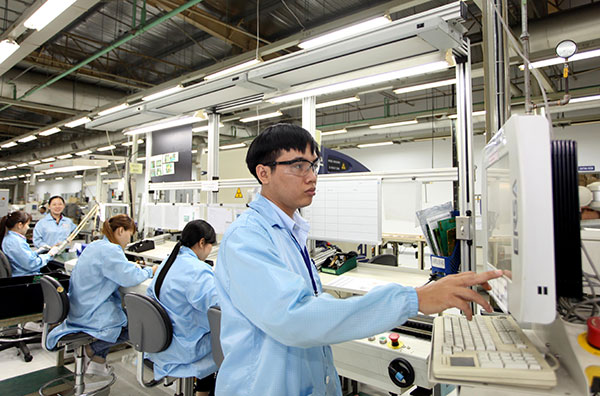The results of the US presidential election were announced, with the victory of Republican candidate Donald Trump.

Trump said he would take a protectionist approach to free trade agreements. The prospects of the ratification of the Trans-Pacific Partnership Agreement (TPP), an accord enumerating the US and 11 Asia-Pacific countries including Vietnam, is now less certain.
VIR asked foreign companies about their sentiments regarding investing in Vietnam in the upcoming months or years and about what impact the Trump presidency may have on future US investments in the country.
Kenneth M Atkinson - Executive chairman of Grant Thornton (Vietnam)
 It would appear that most major markets have responded positively to the election of President Elect Trump and it would seem logical that the Vietnamese stock market would follow suit.
It would appear that most major markets have responded positively to the election of President Elect Trump and it would seem logical that the Vietnamese stock market would follow suit.
However, for companies that were seen to benefit from the TPP and if this was somehow reflected in the price, then it could be that those shares may be adversely affected as it seems unlikely that the President Elect Trump will approve the TPP at least in the short - midterm.
FDI and trade is a little more difficult, depending on the industry sector. For US companies looking at the potential of the domestic market then it is unlikely that there will be any impact. For those companies who are looking at investing in Vietnam to take advantage of the tariff reductions and other benefits under the TPP, then for sure there will be a negative impact. However, overall with the Asean Economic Community and the coming into effect of the EU Vietnam FTA in 2018, there is unlikely to be a major negative impact on FDI.
On the trade side it is really too early to really tell as this will depend whether or not the President Elect pushes through with his plans for higher tariffs on countries like China and whether that policy would extend to Vietnam.
Nguyen Viet Ha - Managing director of BowerGroupAsia
 Trump has different views and opinions, especially about international trade, from the current president. He does not support free trade agreements, as he believes they take away jobs from American citizens. He made public statements implying that he does not support the TPP and even wants to re-negotiate the North American Free Trade Agreement (NAFTA).
Trump has different views and opinions, especially about international trade, from the current president. He does not support free trade agreements, as he believes they take away jobs from American citizens. He made public statements implying that he does not support the TPP and even wants to re-negotiate the North American Free Trade Agreement (NAFTA).
Therefore, Obama's legacy on international trade will likely be short-lived under President Trump. In addition, he is supported by the Republican Party, which dominates both the Senate and the House of Representatives. This will likely create challenges and make US investors less competitive against EU or Asia-Pacific rivals, who are enjoying free trade agreements with Vietnam and the region. However, Trump is unpredictable and passionate, so he may change his views from time to time.
Vietnam has been internationally acknowledged as a rapidly growing market. Although it is at the discretion of businesses to decide on entering and/or maintaining operations in a market rather than relying on their president's personal opinion, the government's policies on international trade and investment will affect their decisions to a certain extent.
Fred Burke - Managing partner of Baker & McKenzie Vietnam
 Republicans are historically pro-trade, and with the House and the Senate now both controlled by Republicans, there is reason to believe that a pro-trade agenda will meet with support and not partisan objections. President-Elect Trump has never said that he is anti-trade, he has said that as a businessman he can negotiate better trade agreements.
Republicans are historically pro-trade, and with the House and the Senate now both controlled by Republicans, there is reason to believe that a pro-trade agenda will meet with support and not partisan objections. President-Elect Trump has never said that he is anti-trade, he has said that as a businessman he can negotiate better trade agreements.
Even if the TPP drags out for a few years, as some US free trade agreements (FTAs) have done in the past, there is plenty of intra-regional growth, fueled by pending trade agreements such as the Regional Comprehensive Economic Partnership (RCEP), the EU-Vietnam FTA, and the Global Trade Facilitation Agreement.
Though less impactful than the TPP, alone or together each will contribute to regional and global growth and the US will inevitably want to be a part of that.
Marko Walde - Chief representative of the German Industry and Commerce in Vietnam
 I think that we should wait and see what will the economic policies effectively look like under President Trump. By then, a lot is just speculation. But I firmly believe that we should therefore take forward in continued further development of German Vietnam business relationships!
I think that we should wait and see what will the economic policies effectively look like under President Trump. By then, a lot is just speculation. But I firmly believe that we should therefore take forward in continued further development of German Vietnam business relationships!
Olivier Do Ngoc - Managing partner of Dynasty Investments
I believe the US election results are significant on a worldwide perspective and more particularly as it relates to the TPP which President-elect Trump has put at the very center of the election by promising to cancel the treaty should he be elected.
There seems to be little doubt that this will happen according to recent declarations. Vietnam was set to gain from the treaty given its export oriented economy so one could easily conclude that this would be a negative for the Vietnamese economy.
We believe though, that Vietnam thankfully has a lot of other very promising sectors to offer no necessarily affected by the trade treaty with a very strong continued macro-economic backdrop and with continuing reforms and market openness. On trade itself, we also believe other factors can counterbalance positively the TPP no going through including the EU-Vietnam Free Trade Agreement and the RCEP with ASEAN and some of its large trade partners in the Asia Pacific region. In general we continue to be optimistic about the prospects of Vietnam and its move to a more service oriented market based economy benefiting for a large, young, educated population and therefore, as longer term, fundamentals driven investors, privilege middle market real estate and consumer goods based investment themes.
by vir